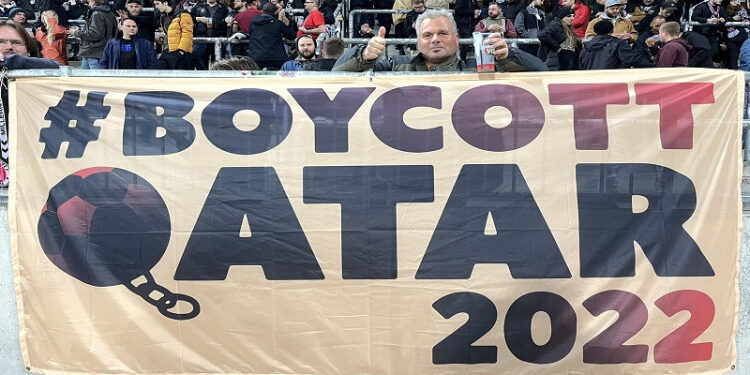Ten days before kicking off the World Cup, Qatar2022, the boycottqatar2022 campaign is in full swing. In question, human rights abuses during the construction of stadiums, as well as the restrictions decided by Qatar during this planetary event.
Boycottqatar2022 banners, we now see each week in European stadiums.
The supporters have chosen their camp
Nearly not happens for a week without supporters having banners calling to boycott the World Cup. “Ultras” supporters, known for their anti -system commitment, see at this World Cup the realization of modern football, based on money, gains and politics. Football that they hate so much.
In addition to this bling-bling side, supporters denounce human rights abuses, recorded during the construction of stadiums in Qatar. The country of the Gulf may have published and republished images showing “the good conditions” in which the workers worked, nothing to do. The multiple surveys carried out by independent journalists demonstrate that there were indeed overruns.
Supporters also denounce the restrictions decided by Qatar during the World Cup: no alcohol except in predefined places, no holidays in the early morning, no sexual relations, not what the Gulf country has described “moral attack”, etc. They also denounce the repression of the rights of LGBT+ people as well as the disastrous ecological impact of this tournament.
The supporters consider the World Cup as a big party where you move, to party. All these restrictions have pushed more than one to cancel the trip to Qatar.
Show between FIFA and participating countries
Realizing that the Boycottqatar2022 phenomenon is growing more and more, FIFA has reacted and summoned the 32 participating countries, in a letter signed by its president Gianni Infantino and its secretary general Fatma Samoura, to “not let football be trained in each ideological or political battle”.
FIFA wanted the federations of these countries to ban the boycottqatar2022 banners in the stadiums.
Ten of the countries concerned have refused to obey FIFA’s request. Indeed, Germany, England, Belgium, Denmark, Norway, the Netherlands, Wales, Portugal, Sweden and Switzerland, have reaffirmed, in a letter sent to FIFA, their desire to “defend human rights, support migrant workers and continue to put pressure on FIFA”.
France is obviously not signatory, applying the adage of Zinedine Zidane, ambassador of the candidacy of Qatar, should be remembered: “We must leave the controversy aside, leave room for the game and the World Cup”.
The ten countries have also signed a spouse, in which they request “concrete responses” concerning the compensation fund for migrant workers and the concept of a center of migrant workers in Doha.
Personalities and cities
Many public, sports and other figures, have publicly announced and called to boycott the CM Qatar 2022.
Eric Cantona told Daily Mail in an interview published on January 12, “Personally, I will not look at her. To be honest, I don’t really care about the next World Cup, which is not a real World Cup for me. In recent decades, many events such as the Olympic Games or World Cups have taken place in emerging countries, such as Russia or China. But Qatar is not the country of football. This is just a matter of money and the way they have treated people who built stages is horrible. And thousands of people are dead ”.
For his part, the former German international, and now president of the organizing committee of Euro 2024 in Germany, Philipp Lahm, said that, outside the professional reason, he would not attend the World Cup in Qatar, adding that he did not “want to go there as a fan. I prefer to follow the tournament from home. If, in my function as director of the Euro tournament, I had a mission or an agenda in Qatar, it would of course be different ”.
Tom Daley, British diver, Olympic champion in Tokyo, openly homosexual, called, in October 2021, to boycott, believing that “the World Cup will take place in Qatar is subject to extreme rules against LGBT+ people and women. I think it should not be allowed to host a sporting event in a country that criminalizes fundamental human rights. ”
Part of the staff of the Wales team said in June that it would not return to Qatar, despite the qualification of its team, due to the non-compliance with the rights of LGBT+people.
Several major French cities have indicated that they will not set up “zones fans” and will not broadcast any match of the tournament on giant public screens, and what the outcome of the Blues matches. These are Besançon, Brest, Bordeaux, Clermont-Ferrand, La Courneuve, Lille, Limoges, Lyon, Marseille, Nancy, Paris, Reims, Rennes, Rodez, Saint-Etienne, Strasbourg and Tours.
If this phenomenon seems above all to touch France, in view of the interest by the international press, the initiative is also followed by several municipalities in Belgium, notably in the Brussels agglomeration.
Qatar’s response
Qatar did not officially respond to this boycott campaign, but has made known its position unofficially through, in particular, the media it controls.
On Beinsport Arabic, the animators and columnists keep evoking the subject by explaining that it is necessary to respect the traditions and culture of the host country of the World Cup, as was the case in all the other countries which previously welcomed the CM.
From time to time, they also recall that no boycott campaign was orchestrated against Russia in 2018, while the Pays de Putin is also granted, in particular with regard to human rights and the rights of the LGBT+community, as Qatar.
Personalities who defend Qatar believe that Western countries do not want an Arab country to organize a World Cup “which will be the best of all time”.








